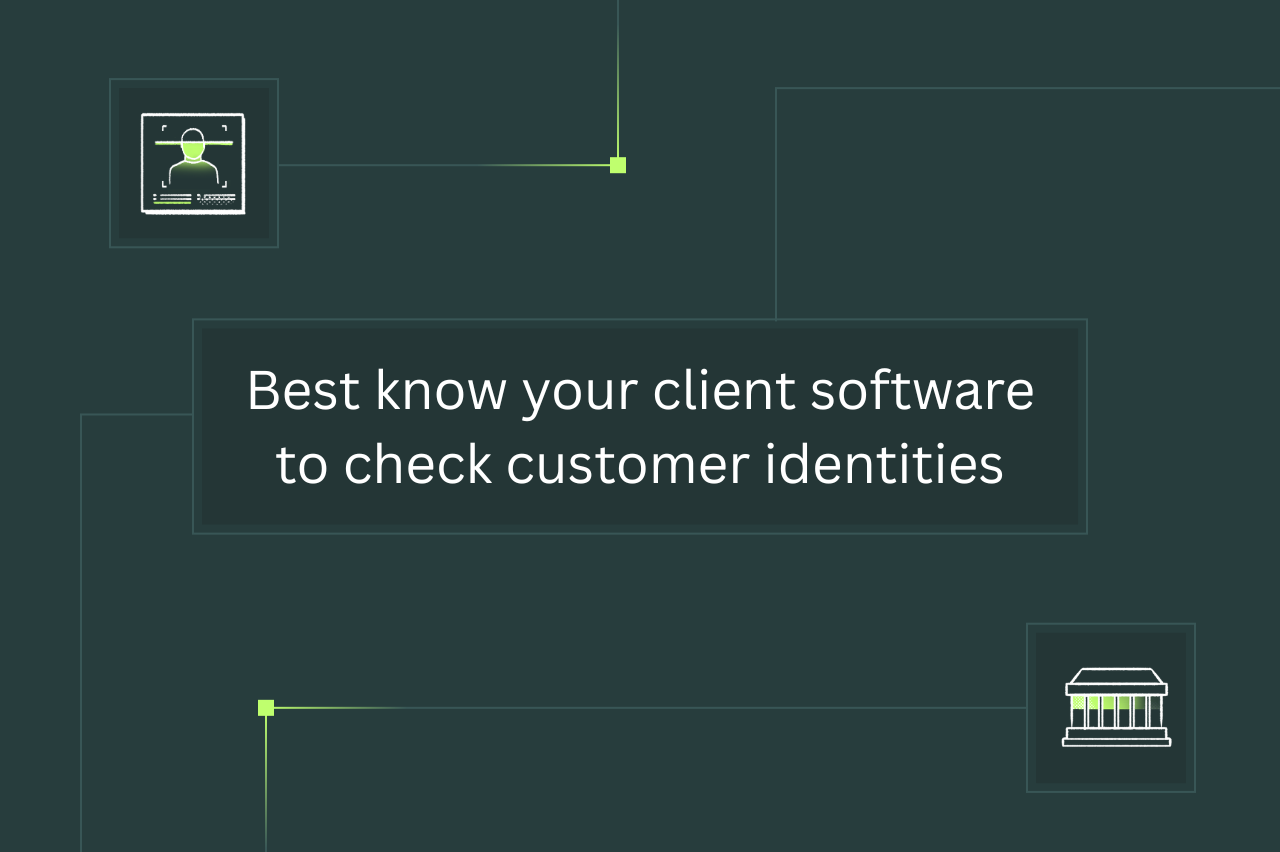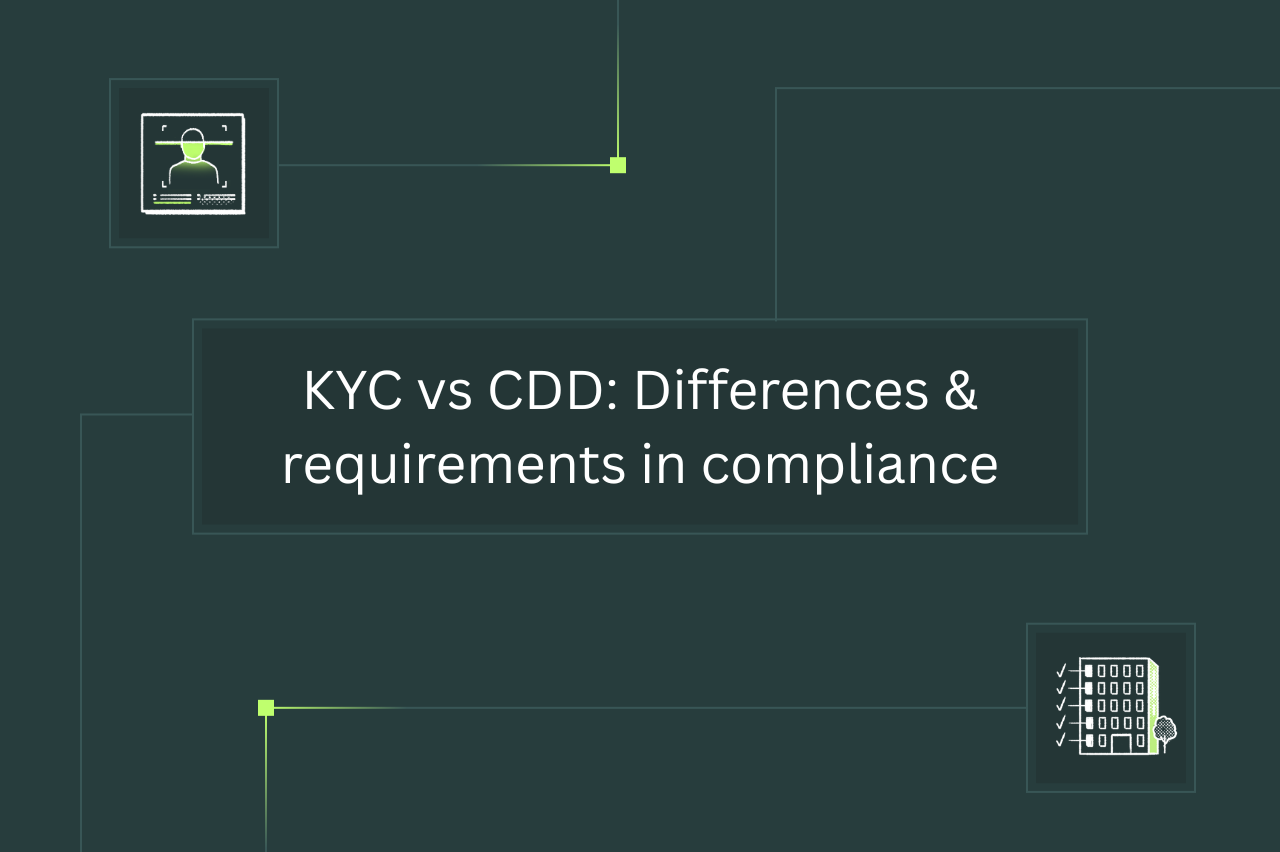In brief:
- Know Your Client (KYC) software is used when verifying financial client identities to speed up processes, check more data sources, avoid errors, and continuously monitor clients and regulations for changes.
- Choosing the right KYC software depends on factors like how big your company and budget are, which regulations you need to comply with, what data you need, how many clients you have, the average and highest risk among your clients, and whether your compliance team is able to use more complex software if your company requires it.
- Features to look for in KYC software include frameworks for a customer identification program (CIP), advanced risk assessment tools (including sanctions lists and other watchlists, politically exposed person and relatives & close associates lists, and adverse media screening), extensive automation, tight security, plentiful customization options, and ease of use.
Financial institutions and other businesses that handle large volumes or values of transactions need to be especially vigilant against crime. Bad actors may exploit fake identities, political ties, or proxy representatives to commit fraud, launder money, or finance terrorism.
This requires FIs and similar businesses to “Know Your Client” – sometimes also referred to as “Know Your Customer” – which means verifying if a client is who they claim to be and how much risk they present of being (or becoming) involved in illegal financial activities. But as financial crime tactics get more sophisticated, and regulations for guarding against them grow tighter, FIs can have trouble keeping up.
That’s why many turn to using Know Your Client software: digital platforms that make running KYC checks faster, more thorough, and error-free. This guide will explain why FIs should use them, how to pick the right one for their company, and what some of the top options are. Here’s a summary:
- Choosing the right Know Your Client software for your team
- 6 important features to look for in Know Your Client software
- Top 4 Know Your Client software providers
- 5 benefits of using Know Your Client software
- 4 crucial Know Your Client software FAQs answered
We’ll start by getting you thinking about what you need to consider when choosing which KYC software is best for your company.
Many KYC software platforms are flexible enough to accommodate companies in different locations and industries. Having said that, you ultimately need a solution that aligns with your team’s workflows, data needs, and compliance requirements.. Here are some factors to consider:
- Compliance requirements: Which international, regional, and industry-specific regulations does your company have to comply with? Does the software come pre-loaded to handle those standards?
- Company size & budget: How many people does your company employ, and how much can it afford to spend on KYC software? Do vendors have multiple plans you can pick from so one might match the size and budget of your team?
- Clientele size & risk profile: How many clients do you have, and how many are you typically gaining or losing over a time interval (monthly, quarterly, etc.)? What are the average and highest risk levels among your clients?
- Ease of use: Do your employees have the skills necessary to use more complicated software, if that’s what your company needs?
- Company-specific KYC needs: Does the software cover areas of KYC you know your company needs to improve? Can it be customized to fulfill those functions?
We’ll add one more: what breadth and depth of data does your company need to effectively conduct KYC? The reason we highlight this one is that it’s equally, if not more, important to think about the quality of your data:
- How many sources does a KYC platform pull data from?
- Are the sources the platform pulls from reputable enough that the data is likely accurate?
- How often does the platform re-retrieve data so it’s not out of date?
These are the key questions you need to answer when testing whether a KYC software platform meets your current compliance needs – and your potential future ones. To learn more, check out our guide on how to run an effective KYB vendor test to put these questions to the test for your business.
{{gated-content-block="/insights/how-to-run-an-effective-kyb-vendor-test"}}
Your company’s needs for a Know Your Client system can vary based on your specific situation. However, there are things that are helpful for your software to have regardless of your final setup. Here are six of them:
1. Framework for Customer Identification Program (CIP)
Customer Identification Programs (CIPs) are strategic action plans for verifying client identities, made mandatory in the U.S. after the passing of the USA PATRIOT Act in 2001. They require financial institutions to have a written policy on:
- Collecting client data essential for identity verification
- Notifying clients that their identity data is needed, and why
- Verifying each client’s data is valid and uniquely theirs
- Checking client IDs against information sources that could indicate risks
- Safeguarding client information for as long as is necessary for compliance
2. Comprehensive risk assessment capabilities
Equally as important as verifying a client’s identity credentials is measuring the amount of potential risk that client represents. There are three associated screening functions you want your KYC software to have:
- Watchlists and sanctions lists – You want to find out if a client is on a criminal or financial watchlist, or other type of sanctions list, to know if they’re dangerous or even illegal to provide services to. In the U.S., for example, it’s important to know how to run an OFAC check against sanctions lists published by the Office of Foreign Assets Control.
- PEP/RCA lists – Politically exposed persons (PEPs) hold influential administrative jobs or other roles that could be abused for illegal financial gain. Even people who have personal or professional ties to PEPs, known as relatives and close associates (RCAs), could exploit or be exploited by a PEP’s position. It’s important to identify which of your clients are PEPs or RCAs so you can assess their PEP risk accordingly.
- Adverse media – News outlets or social media can signal a client could potentially be risky, even before there is official recorded information about them. It’s useful if your KYB software has adverse media screening tools that can retrieve this sentiment data, gauge how credible it is, and evaluate how much it affects a client’s potential risk to your company.
3. Large number of automations
A key reason to use KYC software is to automate parts of your customer due diligence (CDD) process. By completing tedious and repetitive KYC tasks automatically, the software saves you time while limiting the chance of a human error.
This lets your compliance team approve or review more clients in a day, as well as work on complicated screening cases that actually need manual review. All the while, you’re still fulfilling your compliance obligations.
4. Solid data security
Though much of the data used for KYC is “publicly” available, it’s still personal identity information that clients don’t want to see fall into the wrong hands. So a KYC software system should have strong security functions to prevent unauthorized access to this data.
5. Flexible customization options
At a minimum, KYC software should be adaptable to the distinct regulatory requirements of your specific industry and jurisdiction. But it should be customizable in other ways, too. For instance, you should be able to fine-tune it to put heavier emphasis on detecting problems your company most often encounters or considers the most threatening (e.g. identity theft, money laundering attempts, account takeovers, insurance fraud, or loan fraud).
It also helps if your KYC software is able to scale with your company as its client base changes, in terms of both volume and (average) risk level.
6. Easy to integrate and use
Ideally, the KYC software you choose should be intuitive enough that your team members can use it without needing excessive training. It should also be able to fit in nicely with your existing tech stack and other productivity tools (like your accounting program) so you don’t need to learn how to control every part of your business with it. This allows you to hit the ground running with it instead of spending a bunch of extra time setting it up or training on various aspects of it.
We’ve given you a lot to think about so far, so maybe you’re thinking it would be helpful if we gave you some starting points for good Know Your Client software providers. Here are our top 4 picks.
1. Middesk
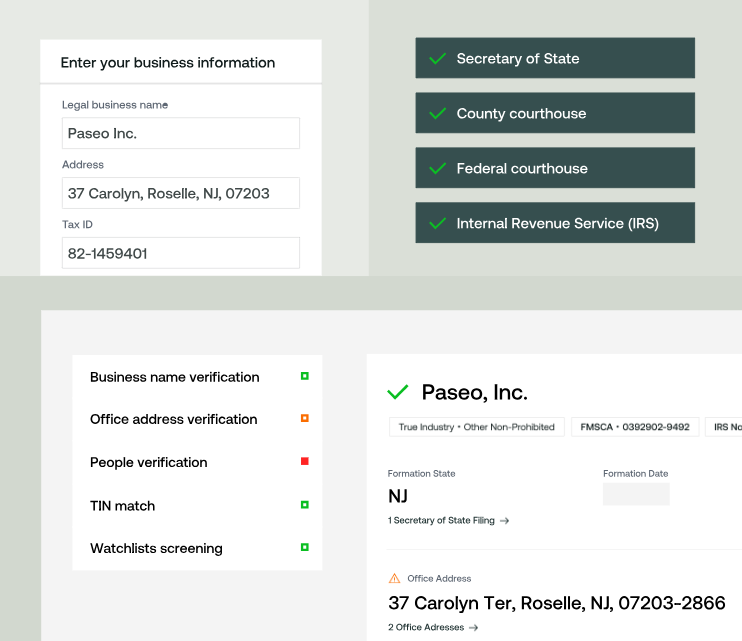
Best for: Identifying and assessing risk for UBOs of U.S. businesses.
Though Middesk is primarily a business verification service, it can also work well for KYC. It draws authoritative data from Secretary of State offices and other U.S. government agencies, as well as alternative data to paint a more comprehensive picture, and data from partner services like Socure to find out who owns a business (the ultimate beneficial owners, or UBOs) and other notable people involved with the business.
It can then verify their identity information and check if they’re on sanctions or watchlists, on lists of politically exposed persons (PEPs) and relatives & close associates (RCAs), being covered negatively in the news, and so on. It even helps with due diligence by providing risk assessment scores for different signals a person gives off.
Learn more about how Middesk’s KYB software can help with KYC and other compliance processes.
2. Alloy
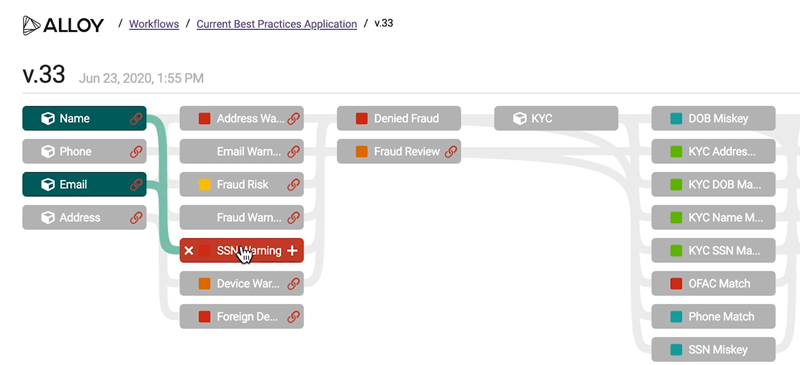
Best for: Dynamic ongoing client identity monitoring via data orchestration.
Alloy provides KYC services for onboarding clients and monitoring them over time. Its unique “data orchestration” approach allows for creating custom client profiles to verify identities and assess risk using data from over 200 reputable sources. These profiles adapt to both information changes and you adding or removing data categories, giving you dynamic identity verification and risk assessment that you can tailor to your unique KYC needs.
3. Treasury Prime
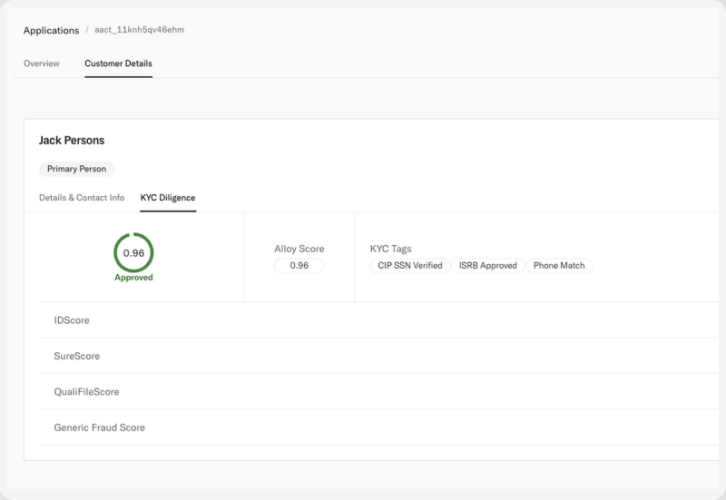
Best for: An all-in-one platform that handles not only KYC compliance, but other banking management functions.
Treasury Prime is a complete bank management platform that includes KYC and other client identification & risk assessment tools. It allows for setting up custom onboarding and risk measurement workflows, monitoring clients in real time for activities & trends that may alter their risk profile, and automating important client reporting tasks. Plus, Treasury Prime integrates with over 20 other compliance tools if you need to fill in gaps in your program.
4. Socure
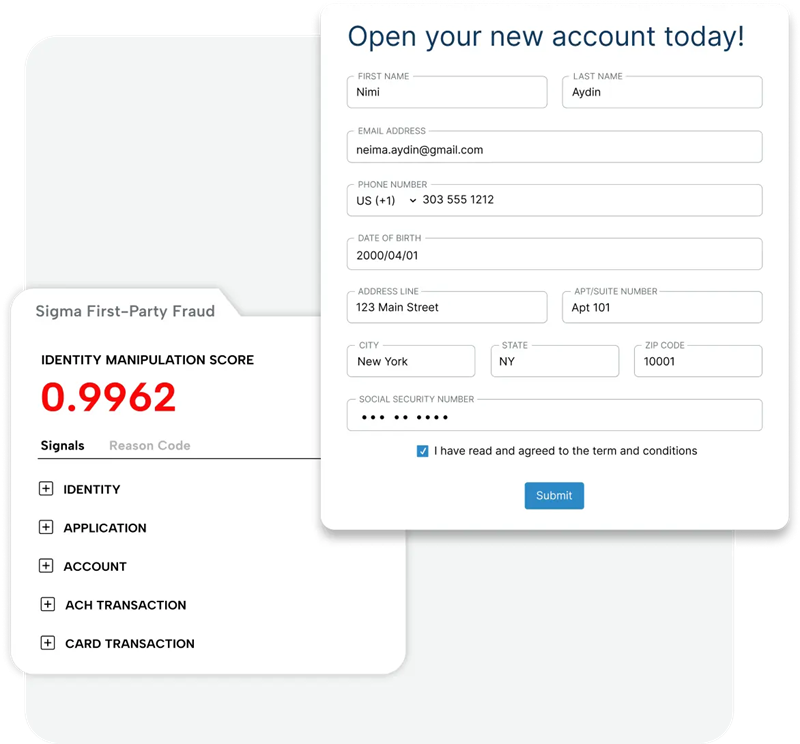
Best for: Businesses wanting to be able to customize and fine-tune their KYC operations for optimal performance.
Socure offers its RiskOS platform and other tools for developing, adjusting, and testing KYC workflows without needing to know how to code. It features over 50 different categories of data with which to assess identity validity and risk through link analysis, risk scoring, and activity history. You can even build KYC workflows from ready-made templates and test KYC system changes in the background without affecting your active compliance operations.
With regulations to guard against financial crime becoming tighter all the time, having Know Your Client software is a virtual necessity for your company to keep up. Here are 5 reasons why:
- Faster client checks: Software can scan a client’s credentials and risk signals much faster than a human can. This makes onboarding easy on your clients while still covering what you need to screen for.
- Wider breadth of data: Manually cross-checking client credentials can cause you to miss risk signals in places you didn’t think of. KYC software covers for that by pulling data from a large pool of credible sources, giving you all the information you need.
- Automation reduces errors and wasted time: Software can be programmed to automatically complete repetitive – but still critical – tasks for KYC. This reduces the risk of your compliance team making small but costly mistakes by doing these tasks manually. It also frees their time up to spend on complicated cases that actually need manual review, or on other higher-priority tasks.
- Staying up-to-date is simpler: Two of the major challenges of Know Your Client are tracking changes to a client’s information (especially related to risk) and staying compliant with new regulation requirements. Software can automatically recognize changes in these areas and update your systems accordingly through real-time compliance monitoring. At the very least, it should alert you to those changes so you can make the updates yourself.
- Flexibility and customization options: Most KYC software platforms have some customization options that let you set them up to conform to regulations in specific industries or locales, or to prioritize detecting particular threats your company tends to encounter more than others. Many are also flexible enough to integrate with other tools you already use so your KYC system doesn’t need to do everything else in your business by itself.
KYC software can also provide these benefits if you need to conduct Know Your Client checks on ultimate beneficial owners (UBOs) of a business: the people who primarily own, control, and benefit from the business. This is part of a larger process of verifying business identities called Know Your Business (KYB).
{{related-content-block="/blog/know-your-business-kyb-identity-verification-explained"}}
Here are some other important things to know about Know Your Client software.
1. What is Know Your Client software primarily used for?
Know Your Client software is used to aid financial institutions and businesses handling large values or amounts of transactions verify the identities of their clients and assess their potential risk. It helps prevent fraud, money laundering, and other financial crime, all while complying with regulations.
In more specific terms, KYC software is used to make KYC checks more comprehensive while also making them more efficient. This includes consulting more credible information sources, faster, to cross-check that a client’s identity information is consistent across official registers. This also allows screening for more potential risk signals on a client, such as if they:
- Have a criminal record
- Have a lien filed against their property (can be found through a UCC or tax lien search)
- Are being covered negatively in the news
- Are the defendant in a lawsuit or other litigation
- Are filing for bankruptcy protection
- Are on a PEP/RCA list
- Are on a sanctions list, or other financial or criminal watchlist
2. Who needs Know Your Client software?
Know Your Client software is primarily needed by banks, other money services businesses, and other types of companies that handle high values or large volumes of transactions. Many of them are regulated by the Bank Secrecy Act (BSA) to prevent fraud, money laundering, and other financial crime.
Here’s what some of those businesses could use KYC software for:
- Banks and fintechs can use it to keep criminals from opening dummy financial accounts intended to be used for fraud, money laundering, or other financial crime.
- Insurers can use it to make sure an applicant isn’t trying to falsify their identity details or factors in their risk profile to fraudulently get a more favorable policy.
- Lenders can use it to check applicants’ ID credentials, credit ratings, and other risk factors to confirm they’re getting appropriate loan amounts and terms, and likely won’t use the money for criminal acts.
- Marketplaces and payments providers can use it to screen both merchants and customers for warning signs they may attempt fraudulent activity.
3. What are other things Know Your Client software can tell me about a business or its associated people?
Many pieces of Know Your Client software are designed to verify identity details and assess risk profiles for businesses as well. Know Your Business (KYB), as it’s called, includes factors that may fall outside of standard KYC, like whether a business:
- Has a physical address that can be visited
- Has all of its registration documents properly filed
- Has an Employer Identification Number (EIN), or other business tax ID, for filing taxes
- Has any applicable licensing needed to operate in certain industries
- Operates in an industry that is inherently risky or could be seen as morally objectionable
- Is on a criminal, sanctions, or financial watchlist, or based in a country that’s on one
- Is currently involved in litigation
- Has any liens filed against its property
- Is currently filing for bankruptcy protection, or has filed for it before
KYB involves a bit of KYC as well. You need to find out who ultimately owns, controls, and benefits from a business: the ultimate beneficial owners (UBOs). Then you need to make sure their identity details check out and that they present an acceptable amount of risk. The latter involves finding out whether any of the UBOs are:
- Significantly wealthy, or known for moving large amounts of money around
- Politically exposed persons (PEPs) due to holding exploitable political positions
- Receiving, or have previously received, significant negative news coverage
- On any sanctions lists or other financial or criminal watchlists, or from a country on one
- Known for making complex financial transactions with questionable purposes
- Known for using high-risk banking methods such as foreign or private banking
Good KYC software will be able to find, verify, and evaluate many of these characteristics to help you make more informed decisions about whether businesses and business owners are safe to onboard.
{{gated-content-block="/insights/report-middesk-index"}}
4. Is Know Your Client software worth the price?
Generally, yes. It does depend a bit on how advanced the software is relative to your company’s size, budget, and overall risk profile. However, it’s almost always better to use software for KYC than not use it.
The reason is conducting Know Your Client checks by hand comes with its own set of risks and costs, many of which are greater than just using software. They include:
- Taking up extra time for your compliance team – and your company as a whole – when they could be working on more important tasks.
- Adding friction to your onboarding, which can frustrate potential customers and cause them to abandon the process altogether.
- Increasing the risk of human error, which could lead to rejecting a legitimate customer or onboarding a bad actor.
- Limiting the number of information sources you can cross-check customers’ identity and risk-related information against with the time you have available.
- Deciding which information sources are credible and which ones are not.
- Potentially spending extra time and money to access credible sources and their information.
- Having to manually update your files or system every time a client’s information changes or regulatory requirements are rewritten.
KYC software can automate and enhance these processes while limiting mistakes. This frees up your company’s resources while keeping your clients happy with prompt service.
Middesk’s Verify product provides all the tools you need to conduct Know Your Client checks on business owners and other potentially high-risk people related to businesses. Identity verification, sanctions list checks, adverse media screening, PEP/RCA status searches – Middesk can do all this and more. It can also look for and verify information on businesses themselves so you can tell whether or not they’re legitimate.
Contact our sales team for a demo if you’re interested in seeing more of what Middesk can do to aid your Know Your Client compliance efforts.

